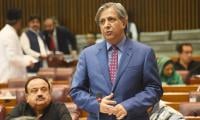The Supreme Court (SC)-designated judicial commission on water and sanitation has recommended that the Sindh government conduct a fresh and comprehensive survey for all the existing water supply and drainage schemes in the province with a view to identify deficiencies in them.
The recommendation is included in the various short- and long-term recommendations sent by the judicial commission to the SC. The commission headed by Justice (retd) Amir Hani Muslim, which will be completing its tenure on January 14, observed that even rehabilitating all the existing water supply and drainage schemes might not completely resolve the water and sanitation issues in Sindh as there were several areas and settlements in the province without any facility for clean drinking water.
The judicial body also recommended that the Sindh government simultaneously undertake another survey to identify the areas deprived of drinking water facilities so that water supply schemes may be designed for them.
Proposing short- and mid-term plans for resolving the water supply and sanitation issues in Karachi, the commission recommended that the Karachi Water and Sewerage Board (KWSB) prepare a master plan for water distribution and sanitation to meet the existing and future demands of the city.
The commission further recommended that the KWSB rehabilitate the existing water supply system, improve quality of water to meet the international health standards, control water losses and install flow meters by June 30, 2019.
For long-term measures, the judicial body suggested that the Sindh government should form a task force to oversee and steer the affairs of the KWSB, which was suffering from in-house inefficiency, lack of coordination, scarcity of resources and shortage of technical human resource.
The commission also stressed the need for streamlining and upgrade of the billing and collection mechanism of the KWSB within three years. A crash programme to create awareness about water conservation was also recommended by the commission.
In view of unhygienic conditions at the Sea View beach due to discharge of untreated sewage from Defence Housing Authority (DHA), the commission recommended that the DHA authorities be directed to ensure that no untreated wastewater was discharged into the sea near Sea View after the completion of a treatment plan in April 2019.
The judicial body also recommended a complete overhaul of Sindh Environmental Protection Agency (Sepa) by strengthening its physical, technical and academic capacity. The government should take steps towards strengthening and establishment of environmental laboratories to carry out research and development work for environmental issues in the province, the commission recommended.
It was also included in the recommendations that Sepa should complete the survey of all the industrial areas, categorise the industrial units and prepare a database for effective monitoring of environmental hazards.
To deal with the disposal of solid waste, the commission recommended that the government identify and establish landfill sites for all the districts of the province.
The judicial body recommended that the Sindh Building Control Authority as well as all other land owning agencies in the province, including cantonment boards and the DHA, should be directed to ensure filing of environmental assessment documents by developers to comply with the provisions of the Sindh Environmental Protection Act, 2014.
The transport department and all municipal corporations in the province should carry out studies on urban air quality, it was recommended.
The judicial body also recommended establishment of combined effluent treatment plants in all the industrial areas through joint ventures of the government and industrial associations.
The commission observed that 539 rural water supply and drainage schemes had been taken up for rehabilitation. It recommended that such schemes be funded sufficiently and completed by June 2019.
All the reverse osmosis plants in Sindh be rehabilitated by June 2019, the commission recommended, adding that the government must ensure that incinerators were installed in all the government-run hospitals.
Supply of filtered clean drinking water at all the government hospitals and schools was also recommended by the judicial body. The commission recommended exploring the prospects of construction of small dams in Tharparkar district, especially in the Nagarparkar region. It also suggested that the capacity of public health engineering department be increased.
The judicial body suggested to the apex court that all the orders and directives passed by the commission between January 14, 2018 and January 14, 2019 be made part of an SC order. The commission observed that any undertaking, commitment and timeframe given by the government, statutory bodies and private entities would remain intact and in case of non-compliance, the officials and persons concerned would face legal consequences.
The commission observed that serious irregularities were committed on part of former public health engineering secretary Tameezuddin Khero who was running the department in an unbefitting manner and some of his actions were also being investigated. The judicial body recommended that the former secretary be not appointed in the departments that look after the fundamental rights of the citizens.
An aerial view of Karachi city. — AFP/FileCelebrating ShakespeareThe National Academy of Performing Arts is...
A representational image showing people taking part in a plantation drive in Pakistan. — UNAP website/FileKARACHI:...
A representational image of a gavel in a court. — Unsplash/FileAn anti-terrorism court has issued bailable arrest...
Two employees while working on a gas pipeline in an unidentified location. — AFP/FileThe SSGC disconnected gas...
Murtaza Bhutto brother of the then prime minister and Pakistan Peoples Party chief Benazir Bhutto . — Facebook/Mir...
CEO, KWSC Engineer Syed Salahuddin Ahmed pose for a photo at the KWSC office this image was released on March 12,...







